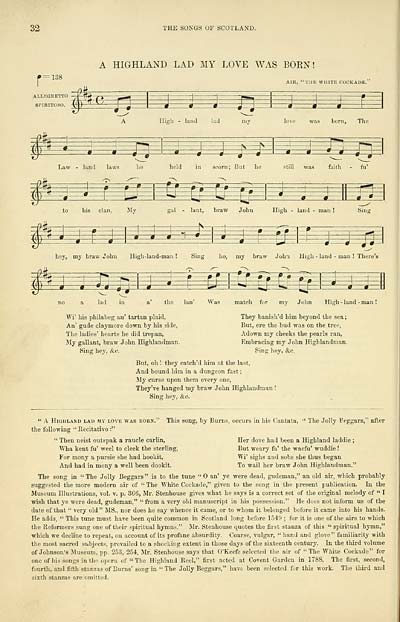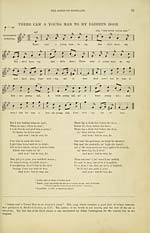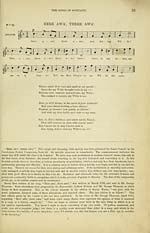Glen Collection of printed music > Printed music > Wood's edition of the songs of Scotland
(56) Page 32 - Highland lad my love was born
Download files
Complete book:
Individual page:
Thumbnail gallery: Grid view | List view

32
THE SONGS OF SCOTLAND.
A HIGHLAND LAD MY LOVE WAS BORN!
138
ALLEGRETTO
is
m
=t=±
High - land lad
my
AIR, "THE WHITE COCKADE.
love was born, The
S
*=t=
K
K
^
-*— a-
Law
land laws
he
held
in scorn; But he
still
faith
fu'
s
£ESE^
B
to his clan,
My
gal
lant, braw John High - land - man !
Sing
mm
'a
hey, my braw John High-land-man ! Sing ho, my braw John High - land - man ! There's
s
— is;:
B
11
SeSeB
lad in
the Ian' Was match for my John High -land -man !
Wi' his philabeg an' tartan plaid,
An' gude claymore down by his side,
The ladies' hearts he did trepan,
My gallant, braw John Highlandman.
Sing hey, &c.
They banish'd him beyond the sea;
But, ere the bud was on the tree,
Adown my cheeks the pearls ran,
Embracing my John Highlandman.
Sing hey, &o.
But, oh ! they catch'd him at the last,
And bound him in a dungeon fast ;
My curse upon them every one,
They've hanged my braw John Highlandman !
Sing hey, &c.
" A Highland lad my love was born." This song, by Burns, occurs in his Cantata, " The Jolly Beggars," after
the following " Recitativo :"
" Then neist outspak a raucle carlin, Her dove had been a Highland laddie ;
Wha kent fu' weel to cleek the sterling, But weary fa' the waefu' wuddie !
For mony a pursie she had hookit, Wi' sighs and sobs she thus began
And had in mony a well been dookit. To wail her braw John Highlandman."
The song in "The Jolly Beggars" is to the tune "0 an' ye were dead, gudeman," an old air, which probably
suggested the more modern air of " The White Cockade," given to the song in the present publication. In the
Museum Illustrations, vol. v. p. 366, Mr. Stenhouse gives what he says is a correct set of the original melody of " I
wish that ye were dead, gudeman," " from a very old manuscript in his possession." He does not inform us of the
date of that " very old" MS., nor does he say whence it came, or to whom it belonged before it came into his hands.
He adds, " This tune must have been quite common in Scotland long before 1549 ; for it is one of the airs to which
the Reformers sung one of their spiritual hymns." Mr. Stenhouse quotes the first stanza of this " spiritual hymn,"
which we decline to repeat, on account of its profane absurdity. Coarse, vulgar, " hand and glove" familiarity with
the most sacred subjects, prevailed to a shocking extent in those days of the sixteenth century. In the third volume
of Johnson's Museum, pp. 253, 254, Mr. Stenhouse says that O'Keefe selected the air of " The White Cockade" for
one of his songs in the opera of "The Highland Reel," first acted at Covent Garden in 1788. The first, second,
fourth, and fifth stanzas of Eurns' song in "The Jolly Beggars," have been selected for this work. The third and
sixth stanzas are omitted.
THE SONGS OF SCOTLAND.
A HIGHLAND LAD MY LOVE WAS BORN!
138
ALLEGRETTO
is
m
=t=±
High - land lad
my
AIR, "THE WHITE COCKADE.
love was born, The
S
*=t=
K
K
^
-*— a-
Law
land laws
he
held
in scorn; But he
still
faith
fu'
s
£ESE^
B
to his clan,
My
gal
lant, braw John High - land - man !
Sing
mm
'a
hey, my braw John High-land-man ! Sing ho, my braw John High - land - man ! There's
s
— is;:
B
11
SeSeB
lad in
the Ian' Was match for my John High -land -man !
Wi' his philabeg an' tartan plaid,
An' gude claymore down by his side,
The ladies' hearts he did trepan,
My gallant, braw John Highlandman.
Sing hey, &c.
They banish'd him beyond the sea;
But, ere the bud was on the tree,
Adown my cheeks the pearls ran,
Embracing my John Highlandman.
Sing hey, &o.
But, oh ! they catch'd him at the last,
And bound him in a dungeon fast ;
My curse upon them every one,
They've hanged my braw John Highlandman !
Sing hey, &c.
" A Highland lad my love was born." This song, by Burns, occurs in his Cantata, " The Jolly Beggars," after
the following " Recitativo :"
" Then neist outspak a raucle carlin, Her dove had been a Highland laddie ;
Wha kent fu' weel to cleek the sterling, But weary fa' the waefu' wuddie !
For mony a pursie she had hookit, Wi' sighs and sobs she thus began
And had in mony a well been dookit. To wail her braw John Highlandman."
The song in "The Jolly Beggars" is to the tune "0 an' ye were dead, gudeman," an old air, which probably
suggested the more modern air of " The White Cockade," given to the song in the present publication. In the
Museum Illustrations, vol. v. p. 366, Mr. Stenhouse gives what he says is a correct set of the original melody of " I
wish that ye were dead, gudeman," " from a very old manuscript in his possession." He does not inform us of the
date of that " very old" MS., nor does he say whence it came, or to whom it belonged before it came into his hands.
He adds, " This tune must have been quite common in Scotland long before 1549 ; for it is one of the airs to which
the Reformers sung one of their spiritual hymns." Mr. Stenhouse quotes the first stanza of this " spiritual hymn,"
which we decline to repeat, on account of its profane absurdity. Coarse, vulgar, " hand and glove" familiarity with
the most sacred subjects, prevailed to a shocking extent in those days of the sixteenth century. In the third volume
of Johnson's Museum, pp. 253, 254, Mr. Stenhouse says that O'Keefe selected the air of " The White Cockade" for
one of his songs in the opera of "The Highland Reel," first acted at Covent Garden in 1788. The first, second,
fourth, and fifth stanzas of Eurns' song in "The Jolly Beggars," have been selected for this work. The third and
sixth stanzas are omitted.
Set display mode to: Large image | Transcription
Images and transcriptions on this page, including medium image downloads, may be used under the Creative Commons Attribution 4.0 International Licence unless otherwise stated. ![]()
| Special collections of printed music > Glen Collection of printed music > Printed music > Wood's edition of the songs of Scotland > (56) Page 32 - Highland lad my love was born |
|---|
| Permanent URL | https://digital.nls.uk/91338415 |
|---|
| Description | Scottish songs and music of the 18th and early 19th centuries, including music for the Highland bagpipe. These are selected items from the collection of John Glen (1833 to 1904). Also includes a few manuscripts, some treatises, and other books on the subject. |
|---|
| Description | The Glen Collection and the Inglis Collection represent mainly 18th and 19th century Scottish music, including Scottish songs. The collections of Berlioz and Verdi collected by bibliographer Cecil Hopkinson contain contemporary and later editions of the works of the two composers Berlioz and Verdi. |
|---|

